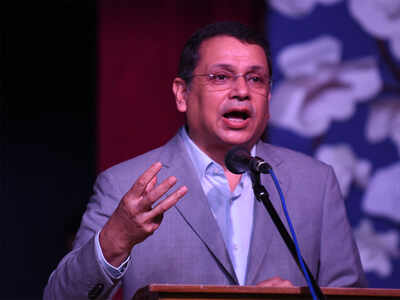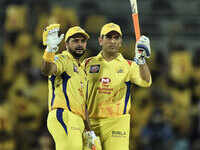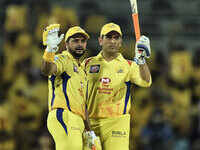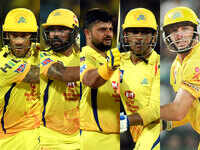
MUMBAI: Uday Shankar, chairman at Star India and the man working to bring the Indian Premier League’s 13th edition to viewers in India and across the world, says “even before a single ball has been bowled, this has already become the most unique IPL”. Shankar spoke to TOI on what’s in play as the league gears up for action in the middle of a pandemic.
Excerpts…
What were the last four-five months about?
Last four-five months were exactly like what it might have been for any other media company in the world because no content creation was happening, be it entertainment or sport. Everything was shut. Here we were, set for a very high-quality, intense IPL in March and then suddenly the BCCI informed us that the tournament wasn’t possible. Obviously, there were very clear reasons for that. People’s lives were more important and live sport was no exception. But it was frustrating too, no doubt, because the context was even more dramatic.
When did you first realised IPL-13 was going to be a possibility?
We had a certain amount of confidence that given the slightest opportunity, IPL would happen. That the current BCCI leadership had to cancel it because of obvious reasons was the right thing to do but they were also committed to bringing the IPL back as soon as possible, once it was safe. We didn’t know the dates, but we did realise it would be possible only post monsoon. The only question was whether it would be held in India or abroad.
And abroad it went, eventually…
Given the fact that the pandemic is still very severe in India, we realised that chances of it happening here were less. In fact, I’m happy and delighted it’s happening in a country and time-zone that is going to be very convenient for Indian fans.
How important is it for this IPL to happen?
Very, and at multiple levels. I think it’s very important for the IPL to come back from the point of view of the Indian society. There are literally very few assets that move an entire country like this and the IPL has become fundamental to our social lives. At a time when the country has been gripped by concerns, and people have mostly been spending time locked indoors, something as important to their lives as the IPL coming back is highly symbolic of the triumph of things positive over things negative.
The stakes are high too…
IPL is India’s only global brand and one of the top sports properties globally too. The fact that BCCI was very committed to make it happen within a bubble of safety came as a huge relief. To me, this IPL is special because until now, what was the conversation people were having: “Hope you're safe”, “things have become so difficult”, “how are your near and dear ones...” etc. For once, there’ll be a different conversation, positive and uplifting.
Other global sporting properties are back in action too…
Of course. And once the IPL returns on television, it will be important for millions of Indian sports fans because it is something they can connect with.
Star has been working on its own bio-secure bubble…
The challenge that has been presented to my team is to deliver an exciting IPL, while keeping every crew member and team member totally safe from the pandemic. That remains our top priority. It’s not an easy one because there are no global role models for something like this. So, we (Star & BCCI) had to sit together and design a good, scientifically robust protocol for ourselves – simply because there was no history or legacy or existing model available to pick from. We also know that we are asking our teams to make sacrifices and massive commitments. To make sure that the families are safe and they’re in a good mental and positive space is a huge challenge. I think we’ve done some highly satisfying work in delivering that.
IPL has gone out of India twice, but this exercise is going to be phenomenal...
The protocol we’ve designed for this IPL can become a global benchmark for any tournament to be held safely. We’ll be doing it at three stadiums with 700+ crew and around 90 commentators working across UAE, India and globally to operate under Covid-related SOPs for 60-75 days. There’ll be a bio-secure bubble in Mumbai to entail 400-plus staffers across six floors of the production facility. Rigorous testing protocols for all staffers entailing pre-screening, testing before entry, and periodic testing during stay. Stringent sanitization and social distancing protocols at production facilities and multiple zones are being set up to keep teams separated.
With that comes some serious responsibility…
The onus is on us to take the responsibility. The BCCI is the umbrella under which everybody operates, and they have a right to expect full safety and reassurance from us. We are very cognizant of our responsibilities and that’s why we’re doing this. Every year it’s a professional commitment. This year’s IPL is a professional and personal commitment. In the end, we all know, it’s a virus and anything can happen, but we would like to have a very clear conscience that we put our best foot forward.
What is the scale of viewership you’re looking at?
Look, I honestly don’t know. There’s been a massive drought of live sport. People have been in a state of mind where they need a break from the last few months and IPL is ideally positioned for that. It’s tough for me to predict the viewership. But even before a single ball has been bowled, this has already become the most unique IPL. There won’t be spectators in the stadiums for some time. We are very focused on making sure the fan experience at home is not impacted. Viewership has never been an issue with IPL. I can only hope it's bigger than ever. There will be seven fully customized broadcast feeds across languages and 18 hours of live and special programming. We expect TV viewership of 550 million+ in India across live broadcast and beyond live programming and the broadcast to be distributed in over 100 countries.
You see sport making return to normalcy anytime soon? Like in-stadia spectators etc…
The pandemic will go away at some point. Right now, everybody is freaking out but some day, and may that be soon, the world will return to normal. The vaccine will come out, remedies will be available. Whenever that normalcy resumes, people will want to go back to the stadiums to enjoy live sport. Ideally, all of us would want to watch a game live. It’s because all of us can't watch it at the stadium, we opt for other mediums. But that doesn't mean live broadcast has eaten into stadium attendance. In fact, it has further helped stadium attendance.
Has Covid fast-tracked the use of technology in sports broadcast?
Technology has only made the engagement of the fans deeper and wider. One effect of the pandemic is that the use of technology to fine-tune and deploy greater creativity for a superior fan experience is going to get much better. Technology was always there but what the pandemic has done is brought that technology front and centre. I think the role of technology in creative reimagination is going to be a lot more essential and relevant going forward.
Excerpts…
What were the last four-five months about?
Last four-five months were exactly like what it might have been for any other media company in the world because no content creation was happening, be it entertainment or sport. Everything was shut. Here we were, set for a very high-quality, intense IPL in March and then suddenly the BCCI informed us that the tournament wasn’t possible. Obviously, there were very clear reasons for that. People’s lives were more important and live sport was no exception. But it was frustrating too, no doubt, because the context was even more dramatic.
When did you first realised IPL-13 was going to be a possibility?
We had a certain amount of confidence that given the slightest opportunity, IPL would happen. That the current BCCI leadership had to cancel it because of obvious reasons was the right thing to do but they were also committed to bringing the IPL back as soon as possible, once it was safe. We didn’t know the dates, but we did realise it would be possible only post monsoon. The only question was whether it would be held in India or abroad.
And abroad it went, eventually…
Given the fact that the pandemic is still very severe in India, we realised that chances of it happening here were less. In fact, I’m happy and delighted it’s happening in a country and time-zone that is going to be very convenient for Indian fans.
How important is it for this IPL to happen?
Very, and at multiple levels. I think it’s very important for the IPL to come back from the point of view of the Indian society. There are literally very few assets that move an entire country like this and the IPL has become fundamental to our social lives. At a time when the country has been gripped by concerns, and people have mostly been spending time locked indoors, something as important to their lives as the IPL coming back is highly symbolic of the triumph of things positive over things negative.
The stakes are high too…
IPL is India’s only global brand and one of the top sports properties globally too. The fact that BCCI was very committed to make it happen within a bubble of safety came as a huge relief. To me, this IPL is special because until now, what was the conversation people were having: “Hope you're safe”, “things have become so difficult”, “how are your near and dear ones...” etc. For once, there’ll be a different conversation, positive and uplifting.
Other global sporting properties are back in action too…
Of course. And once the IPL returns on television, it will be important for millions of Indian sports fans because it is something they can connect with.
Star has been working on its own bio-secure bubble…
The challenge that has been presented to my team is to deliver an exciting IPL, while keeping every crew member and team member totally safe from the pandemic. That remains our top priority. It’s not an easy one because there are no global role models for something like this. So, we (Star & BCCI) had to sit together and design a good, scientifically robust protocol for ourselves – simply because there was no history or legacy or existing model available to pick from. We also know that we are asking our teams to make sacrifices and massive commitments. To make sure that the families are safe and they’re in a good mental and positive space is a huge challenge. I think we’ve done some highly satisfying work in delivering that.
IPL has gone out of India twice, but this exercise is going to be phenomenal...
The protocol we’ve designed for this IPL can become a global benchmark for any tournament to be held safely. We’ll be doing it at three stadiums with 700+ crew and around 90 commentators working across UAE, India and globally to operate under Covid-related SOPs for 60-75 days. There’ll be a bio-secure bubble in Mumbai to entail 400-plus staffers across six floors of the production facility. Rigorous testing protocols for all staffers entailing pre-screening, testing before entry, and periodic testing during stay. Stringent sanitization and social distancing protocols at production facilities and multiple zones are being set up to keep teams separated.
With that comes some serious responsibility…
The onus is on us to take the responsibility. The BCCI is the umbrella under which everybody operates, and they have a right to expect full safety and reassurance from us. We are very cognizant of our responsibilities and that’s why we’re doing this. Every year it’s a professional commitment. This year’s IPL is a professional and personal commitment. In the end, we all know, it’s a virus and anything can happen, but we would like to have a very clear conscience that we put our best foot forward.
What is the scale of viewership you’re looking at?
Look, I honestly don’t know. There’s been a massive drought of live sport. People have been in a state of mind where they need a break from the last few months and IPL is ideally positioned for that. It’s tough for me to predict the viewership. But even before a single ball has been bowled, this has already become the most unique IPL. There won’t be spectators in the stadiums for some time. We are very focused on making sure the fan experience at home is not impacted. Viewership has never been an issue with IPL. I can only hope it's bigger than ever. There will be seven fully customized broadcast feeds across languages and 18 hours of live and special programming. We expect TV viewership of 550 million+ in India across live broadcast and beyond live programming and the broadcast to be distributed in over 100 countries.
You see sport making return to normalcy anytime soon? Like in-stadia spectators etc…
The pandemic will go away at some point. Right now, everybody is freaking out but some day, and may that be soon, the world will return to normal. The vaccine will come out, remedies will be available. Whenever that normalcy resumes, people will want to go back to the stadiums to enjoy live sport. Ideally, all of us would want to watch a game live. It’s because all of us can't watch it at the stadium, we opt for other mediums. But that doesn't mean live broadcast has eaten into stadium attendance. In fact, it has further helped stadium attendance.
Has Covid fast-tracked the use of technology in sports broadcast?
Technology has only made the engagement of the fans deeper and wider. One effect of the pandemic is that the use of technology to fine-tune and deploy greater creativity for a superior fan experience is going to get much better. Technology was always there but what the pandemic has done is brought that technology front and centre. I think the role of technology in creative reimagination is going to be a lot more essential and relevant going forward.
Download
The Times of India News App for Latest Sports News

Coronavirus outbreak
Trending Topics
LATEST SPORTS VIDEOS
More from TOI
Navbharat Times
Featured Today in Travel
Quick Links
DC Players 2020KXIP player list 2020RCB 2020 IPL teamSRH Players list 2020CSK Players list 2020IPL 202o Players ListChampions LeaguePremier League tableUpcoming Cricket ScheduleCricket Match resultsMI Players list 2020IPL 2020 ScheduleRajasthan Royals team 2020KKR squad 2020WWE Raw resultsTennis newsHockey newsFootball newsCricket ScoreCricketBCCI
Get the app









